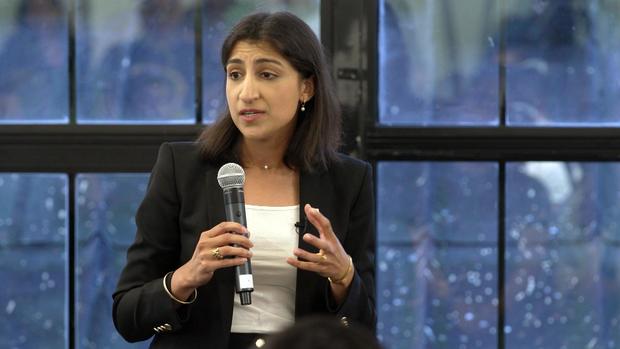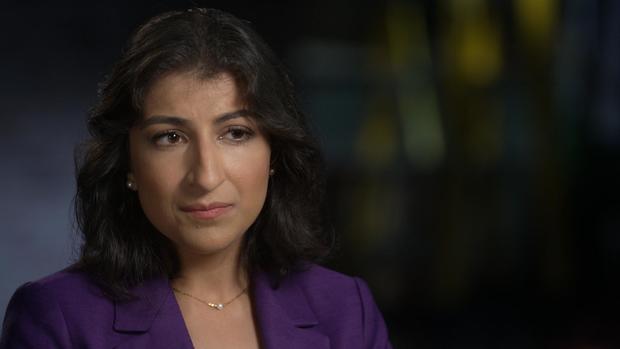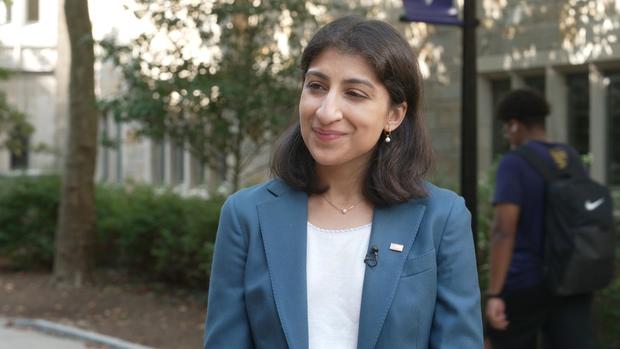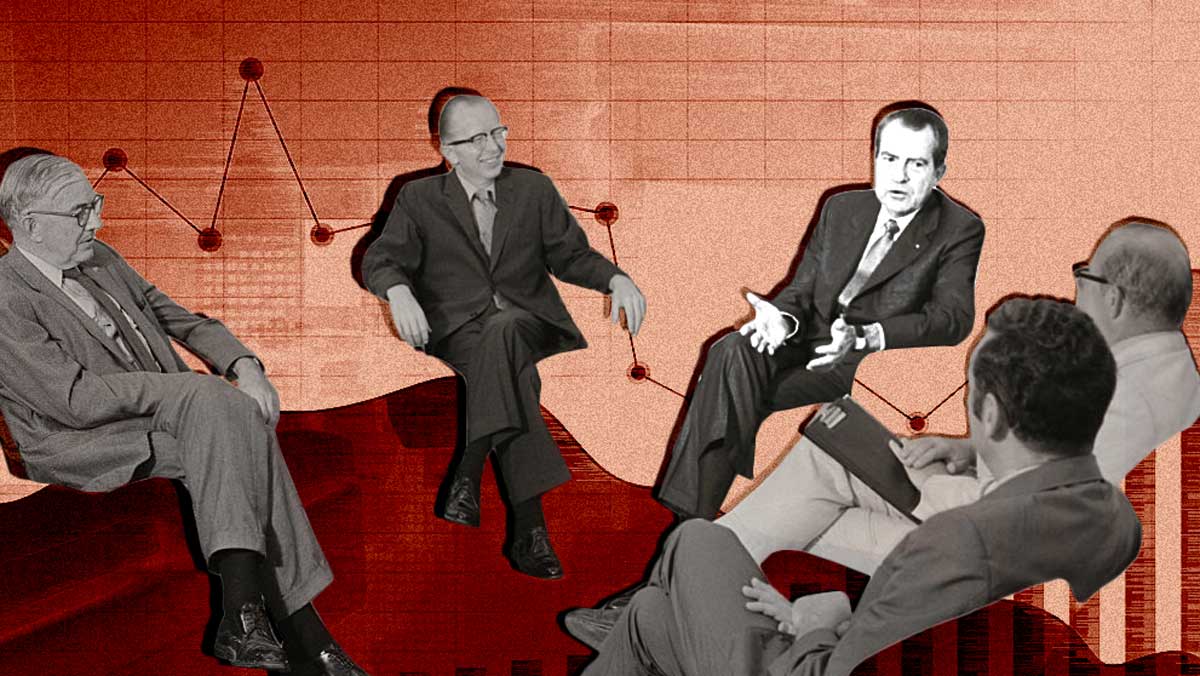FTC trustbuster Lina Khan: feared in boardrooms, cheered on by progressives — and even some MAGA Republicans
Everywhere you go people are complaining about inflation: voters say it's their number one issue.
Enter trustbuster Lina Khan – the youngest chair ever of the Federal Trade Commission – just 32 when she was named. She says much of the blame for the exorbitant prices on everything from food to concert tickets, is widespread corporate consolidation.
The FTC's mission is breaking illegal monopolies, blocking mergers that stifle competition, and protecting consumers from a system Lina Khan says is rigged against them. But she's so aggressive that she's feared and loathed in boardrooms - seen as a zealot and a bully, and yet --
At town hall meetings around the country, Lina Khan is often swarmed by young people taking selfies, small business owners giving her cards, union members – to whom she preaches the perils of business monopolies.
Lina Khan: Too often fewer and fewer companies are controlling more and more of the market. And what that means is companies can start ripping you off, hiking prices, stealing from you.
She calls these events her "listening tours," that she does in both red and blue districts -- this one hosted by Congresswoman Alexandria Ocasio-Cortez.
Crowd Member: Every time I go to the supermarket, I get sticker shock. Groceries are so expensive now. What can be done to help people like me who are worried about grocery prices? Thank you.
Lina Khan: The FTC is currently in court trying to block the largest grocery merger in U.S. history.
Between Kroger – that owns Ralph's - and Albertsons, that owns Safeway. Together they have nearly 5,000 locations. Khan says this merger risks raising food prices even higher than they are now.
Lesley Stahl: Grocery prices have gone through the roof. I believe that you think it's because of monopolies, but most economists say that it's because of supply chains caused by Covid and the Ukraine war. So which is it?
Lina Khan: So there's no doubt that the pandemic and the war led prices to soar. What's been interesting is that even as some of those supply chain pressures have eased, prices have not come down concurrently as much.
Lesley Stahl: So instead of inflation, are you contending that it's greedflation? That these monopolies are deliberately hiking the prices?
Lina Khan: So there's a lot of discussion about what's driving the inflation and we've actually seen some executives boast on earnings calls about how inflation is great for their bottom line.
Lesley Stahl: They say that?
Lina Khan: They have said that publicly, yes.
Lesley Stahl: What about the argument that when companies merge prices often come down, because of efficiencies, scale?
Lina Khan: But even if those efficiencies arise, if the company's not checked by competition it won't have an incentive to pass those benefits on to the consumer because those consumers may not have anywhere else to go.
Another consumer concern: the high cost of medicine.
Pharmacist: As far as negotiating prices—
Khan talks to independent pharmacists about the tricks and traps she says big pharma uses to jack up prices. For example, she zeroed in on the makers of asthma inhalers for extending their patents to keep low-cost generics off the shelves.
Lesley Stahl: On these inhalers, they cost $7 in France. The same exact inhaler is around $500 in the United States. Wow. Now, something's out of whack.
Lina Khan: We agree. So we took a close look at this and we found that companies were listing patents for things like the inhaler cap or the strap on your inhaler, so nothing to do with the actual ingredients of the drug or the formulation or composition of the drug.
Lesley Stahl: So this is an inhaler for asthma. Show us what the innovation was that they claimed allowed them to extend the patent.
Lina Khan: So it's this strap that they listed a patent for, this little piece of plastic.
Lesley Stahl: No! They were saying that they should be able to continue the patent; generics can't come in for the medication, because they put that strap on--
Lina Khan: That's right--
Lesley Stahl: --to make sure you didn't lose the cap.
Lina Khan: That's right.
After the FTC sent warning letters to the four major inhaler makers, three of them – including this one - dropped the price from hundreds of dollars to just 35. And two days ago, the FTC filed a lawsuit to bring down the price of insulin and scores of other drugs, suing three companies the agency says are responsible for manipulating most of the prices.
Lina Khan: These really fundamental things about people's daily material lives are affected by things like antitrust.
But investment bankers, venture capitalists, and top CEOs say she's biased against them - that Lina Khan picks on winners because they're winners and thinks big is always bad.
Lesley Stahl: Actually, Khan's doggedness represents a shift in policy, a mandate to reverse decades of a hands-off strategy toward mergers and acquisitions. It was introduced by Ronald Reagan and adopted by all presidents since, including Clinton and Obama, until President Biden put an end to it.
President Biden (in 2021): We are now 40 years into the experiment of letting giant corporations accumulate more and more power, and where-- what have we gotten from it? Less growth, weakened investment, fewer small businesses.
Under President Biden the FTC and the Justice Department have unleashed a crackdown, suing scores of companies, including Ticketmaster, Nvidia, and the big five: Amazon, Meta, Microsoft, Apple, and a court just deemed Google an illegal monopoly. It's a revolution, and the face of it is Lina Khan.
Male Student: We're all law students and we love you.
Female Student: Can we have a selfie?
Lina Khan: Sure!
Male Student: Three, two, one. Thank you.
When Khan was a student here at Yale Law School, she wrote a paper called "Amazon's Antitrust Paradox" contending that even though Amazon's prices are low, it's still a monopoly.
Lesley Stahl: This was seen as an extraordinary breakthrough. And it went viral.
Less than five years later, President Biden made her head of the agency that polices Amazon.
Lesley Stahl: You know, Amazon is a very popular company. People like the convenience, the choice, the prices are pretty moderate. And they're afraid that you're gonna tamper with something that's good, that they like.
Lina Khan: Our investigation uncovered that Amazon's illegal practices were actually raising prices for consumers because it had illegally muscled out rivals, locked them out of the market in ways that if you had more competition that Amazon hadn't squashed, consumers would be even better off.
Amazon denies doing anything illegal and says if Khan wins, prices will go up. Also in the FTC's crosshairs: the issue of tech giants buying up smaller companies.
Lina Khan: In the technology markets we went through a couple of decades where we saw over 800 acquisitions by the five big players, not a single one of which was blocked. And some of those we realize ended up leading to significant harm. Just to give you a concrete example, there were companies that were offering Americans greater privacy and they were promising that we're not gonna use your data, we're not gonna sell it, we're not gonna spy on you everywhere all the time. After some of those firms were bought up by one of the big guys, all of those data privacy policies changed overnight. And so Americans lost those privacy protections.
Lesley Stahl: You're talking about Facebook and WhatsApp?
Lina Khan: Yes, that's one example of that.
She's now suing over Facebook's acquisitions of Whatsapp and Instagram.
Lesley Stahl: Is the mandate to reverse what's gone on for 40 years, to undo some of the mergers that were approved.
Lina Khan: We've identified not just one merger, but a whole string of mergers that some of these large companies made that we believe were illegal, that we believe were anti-competitive.
Lesley Stahl: But they were approved.
Lina Khan: They were not blocked, they were not challenged.
But the courts don't always side with her. The FTC has lost a couple of big cases against Meta and Microsoft. Yet her cage-rattling has had a chilling effect where companies simply drop their merger plans.
Lina Khan: Sometimes, you know, the companies decide that they're gonna abandon the merger.
Lesley Stahl: If someone just says, "I'm not going to go forward," that's a win?
Lina Khan: That's right.
Lesley Stahl: Obviously the companies are complaining like hell, screaming. They don't like you. They're afraid of you.
Lina Khan: Well, look, we're doing our job enforcing the law-- and—
Lesley Stahl: They are they're afraid you're going to tie 'em up in court, you're going to cost them a lot of money and they're saying, "It's just not worth it."
Lina Khan: So it's important to step back and keep all of this in context. Of all the thousands of deals that are proposed every year, the FTC and DOJ collectively investigate maybe 2% or 3%.
That might not sound like a lot, but start-up founders complain that she's spooking investors so much, she's actually stifling innovation. Others fear that her chasing the tech giants will cause a domino effect. Earlier this month, after it was reported that her counterpart at the Justice Department subpoenaed the chip maker Nvidia the stock market plunged.
Lesley Stahl: Do you ever worry about the power that the FTC and the chairman have that could result in a destabilizing of basically the whole economy?
Lina Khan: Of course we have to worry. But we also should worry about the destabilizing effect that can arise from companies believing that they're above the law, and that they can be reckless, take massive risks in ways that can crash the economy, and then they can get away with just a slap on the wrist. And that creates a destabilization too.
Khan can be seen as a belated reaction to the financial crisis when the government decided banks were "too big to fail." But has the pendulum swung too far? Corporations are pushing back with their own lawsuits to rein her in, setting up a possible showdown at the Supreme Court over the fate of the FTC.
Lesley Stahl: Should you be concerned that you are flirting with diminishing the muscle-- the powers that you have if the Court decides you're wrong? And this Court could very likely say you're wrong.
Lina Khan: I think one challenge that agencies can face is when they shrink their own powers and authorities by not actually using the authorities that Congress has given them.
She's obviously unlikely to survive in her job if former President Trump wins, though she's admired by vice presidential nominee JD Vance –
Sen. JD Vance: Well look, I don't agree with Lina Khan on every issue to be clear, but I think that she's been very smart about trying to go after some of these big tech companies.
She's surprisingly popular with other MAGA Republicans.
Lesley Stahl: There's even a nickname for conservatives who support you. What is it?
Lina Khan: I'll let you–
Lesley Stahl: Khan-servatives. Khan-servatives.
On the flip side, it's unclear she would keep her job if Vice President Harris wins.
Lesley Stahl: Some of her biggest donors are people who want her to get rid of you. They want you off the scene. And they're not just saying it privately. They're going on television.
Lina Khan: Look, you know, my focus is not listening to what CEOs are saying on TV. You know, it's important in these jobs to really stay focused and block out a lot of the noise.
Lesley Stahl: If you were asked to keep this job, would you say yes?
Lina Khan: Obviously, those are conversations one has with one's family and that sort of thing. But—
Lesley Stahl: You don't wanna have it with me?
Lina Khan: But absolutely, I mean, there's so much work to be done, and it's such an honor to be in this role. And it would be an honor to have that opportunity to keep going.
Produced by Shachar Bar-On. Associate producer, Jinsol Jung. Broadcast associate, Aria Een. Edited by April Wilson.








